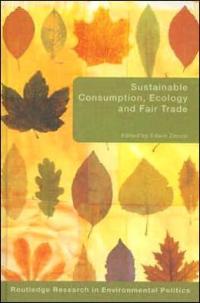Sustainable Consumption, Ecology and Fair Trade
Edited by Edwin Zaccai, Taylor&Francis Publishers,United States/UK., abril 2007

This timely volume discusses the debates concerning sustainable consumption and the environment.
Sustainable consumption stands as a wide objective that attracts a growing attention within sustainable development policy circles and academic research. The contributors examine a range of interesting and relevant case studies including: household energy consumption, sustainable welfare, Fair Trade, Oxfam Worldshops, cotton farming and consumer organizations.
Sustainable Consumption takes an interdisciplinary approach and is well-balanced, presenting theoretical debates as well as empirical evidence in order to:
characterize the basic problems and determiners of an evolution towards, and the obstacles to, more sustainable consumption patterns
produce knowledge on the profile of consumers sensitive, and not sensitive, to these issues
explore realistic modes of interaction and innovation for changes in which consumers are involved.
This text will be of interest to students and scholars of politics, environment studies and sociology.
Contents
1. Introduction Sustainable Consumption: A Short List of Contradictions Part 1: Consumption: What Kind of a Problem for Sustainable Development? 2. Sustainable Household Consumption: Fact, Future or Fantasy? 3. Epistemological Approach of Consumption: How to Attribute Power to the Consumers? 4. Unsustainable Consumption in Social and Psychological Context 5. Sustainable Consumption and Sustainable Welfare 6. What’s Wrong with Consumption: Overconsumption, Underconsumption, Misconsumption? 7. Consumption: A Field for Resistance and Moral Containment 8. Fair Trade and Economic Growth Part 2: Who Are the (Ir)responsible Consumers and Why? 9. Belgian Households and Sustainable Consumption: Capacity and Incapacity of Action 10. The Dynamic of Sustainable Consumption: Results of Qualitative Surveys 11. What Justifications for a Sustainable Consumption? 12. Consumption as a Solidarity-Based Commitment: The Case of Oxfam Worldshops’ Customers Part 3: How Can (or do) Consumers and Citizens Influence Producers? 13. Marketing Ethical Products: What Can We Learn from Fair-Trade Consumer Behaviour in Belgium 14. Can Fair Trade be Extended to Massive Sales? 15. Impact of the Construction of Quality Networks at Farmer’s Level: The Example of Fair Trade Cotton 16. Changing Companies for Changing the Consumer’s Behaviour, Application of the Actionalist Theory
